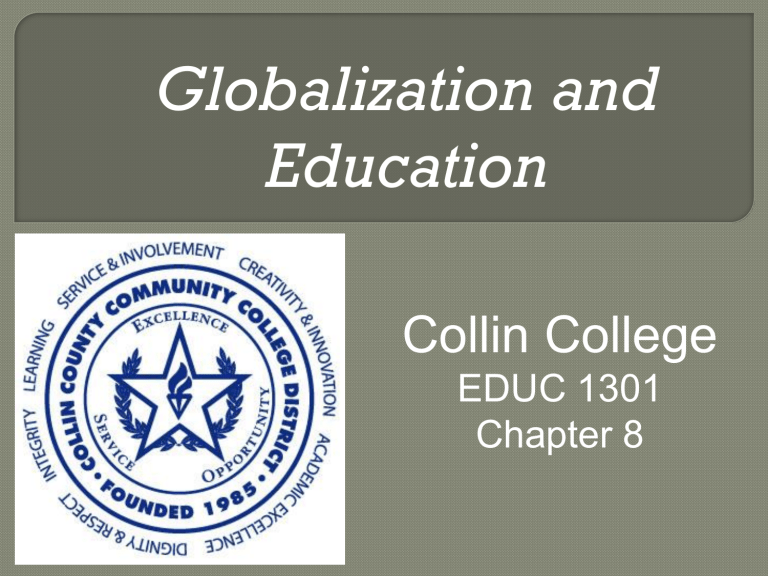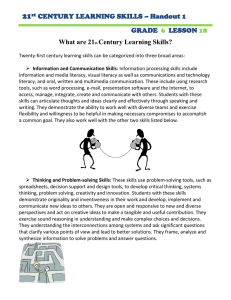
Globalization and
Education
Collin College
EDUC 1301
Chapter 8
Globalization: Increasing
global
interdependence in economic, cultural,
social, & tech spheres
Knowledge economy: Dominated by
exchange of knowledge
• Knowledge is an important asset and a product
of major economic & cultural value
• There exists a fiercely competitive global work
force
Skills that must be taught in school:
• Technological
• Collaborative
• Creative problem-solving
• Fluency in languages besides English
Personal traits that are important:
• Flexibility, comfort with change
• Curiosity, passion for learning
Teaching
in the 21st Century
http://www.youtube.com/watch?v=OTIBDR4Dn2g
• Teachers are no longer the source of information,
they are the FILTERS
• Focus on SKILLS
• Goal is CREATING
• Engagment
Active
Meaningful
Creative
Powerful
For Learning
Applicable
Fun
Long-term
Problem-Solving
Exciting
Review “Teaching
in the 21st Century”
Using Social Studies TEKS for selected
Grade level and the Lesson Plan Template,
plan a 21st Century lesson in which students
gather data from reliable sources and
collaborate to create an age-appropriate
business/presentation to show master of the
concept of “goods or services”
Fill out all parts of the lesson plan template
Copyright by Houghton Mifflin Company. All rights
reserved.
95
Knowledge
of the world
Creative problem-solving skills
Ability to manage new information
sources
• Sort, interpret, validate, and act on vast amounts
of fast-changing information
Collaboration
skills
• Cultural sensitivity and fluency in other
languages are important skills for global teams
ePals
Global Community
http://www.epals.com/
• Links students in 200 countries
• Teacher can choose match by type of school, age
range of students, languages spoken
Example
of cross-cultural science project
• By high school students from 3 countries
• They describe collaboration process
Intercultural
E-mail Class Connections
http://www.iecc.org/
International Ed. and Resource Network
http://www.iearn.org/
United Nations programs
Lesson
Info
plans & videos on global issues
about educational
videoconferencing
Part of the pre-conference materials
sent to help teachers prepare their
students for a discussion about
asteroids
Source: NASA Digital Learning Network, Asteroids PowerPoint Presentation,
http://nasadln.nmsu.edu/dln/content/catalog/details/?cid=67
Real-time
audio & video communication
that allows people in different locations
to “meet face-to face”
• “Virtual field trips” to museums, zoos
• NASA scientists and engineering experts
videoconference with students
Provide pre- and post-conference materials to
teachers
Videogame culture: gaming refers to
playing computer and video games.
Video game culture is a form of new
media that has enormous potential for
teaching and learning.
When
developed correctly, games can
engage players in learning that is
specifically applicable to school
curriculum.
Students
and teachers in different places
Increasingly common at high school level
How they work:
• Students communicate daily with teacher
• Counselor tracks students’ progress
• Student needs maturity, motivation, and good
work habits to succeed.
• High school students who cannot find courses
offered in their own schools can now take these
courses online! Especially important in rural
areas.
Especially
important in poor and rural
pre-K–12 schools that……
• May lack resources for advanced classes
• Can provide cultural enrichment in schools with
limited diversity
In all schools:
• Can provide classes that would be otherwise
unavailable to students
• Opportunity for international study, crosscultural experience
Your
job is to help students:
• Make meaning of information
• Develop skills for polite cross-cultural
communication
• Collaborate in a productive manner
This
teaching environment changes:
• Teacher-student interactions
• Peer communication
• Assessment and accountability
It
is hard to predict what the world will be
like when your students become adults
Connectivity, communication, and
collaboration are the new “reading, ’riting,
and ’rithmetic”
We need the “three Rs” to master the “three
Cs”
To teach today, we must keep pace with
rapid change;
Global communication challenges us to
expand our vision and work for positive
change!

